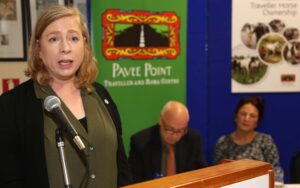Traveller horse ownership significant to overall horse industry
Traveller Horse Owners have a particular niche and experience within the horse industry and Traveller horse projects need to be part of the implementation of the overall Irish Sport Horse Industry Strategy, a new report states. (click on image for full report) All photos by Derek Speirs.
“This report shines a light on issues that are hampering progress in this area and shows how Traveller horse ownership can be nurtured as a significant part of the Irish horse industry into the future,” said Martin Collins, Pavee Point Co Director.
“Travellers have a vibrant and strong horse tradition that is a symbol of Traveller culture and identity. The Irish Cob, a horse uniquely bred by the Traveller community, is now a known and loved breed all over the world. Irish society needs to be proud of this tradition and to support Travellers to protect and promote it,” he said.
Horse Ownership Vital to Travellers
The report ‘Traveller Horse Ownership’ highlights how horse ownership plays a central and multi-faceted role in Traveller culture. It is an element in the Traveller economy, sport and recreation and Traveller health and well-being.

Interviewees, the report states, described art competitions for young Travellers where all entries contained some reference to horses. Horses are ever present in storytelling within the community. Images of horses are often found in Traveller homes.
Crisis
However, Traveller horse ownership is in crisis, the report says. The cultural significance of the horse to Travellers has not been facilitated or acknowledged

Only a small number of local authorities support Traveller horse projects, although local authorities remain the only source of funding for such projects. Funding options need to be broadened out, the report recommends.
Enforcement dominates the response to Traveller horse ownership, the report states.
Many Traveller horse owners have found it hard to comply with recent legal requirements. This has been compounded by the economic crisis and has resulted in a divide between Traveller horse owners and law enforcers.

Shift to Support
The report calls for a shift of thinking and perspectives on both sides. Responsible horse ownership that encompasses quality breeding needs to be combined with evidence of support for significant development work.
The report makes concrete recommendations:
-
Employment of development workers
-
Establishment of Traveller Horse Owner Associations
-
Stabling and training projects
-
Knowledge transfer groups
-
Regulated racing
-
Stud book for the heavy cob associated with Traveller horse ownership

Niall Crowley, co author of the report says there is a need for leadership from the Dept of Agriculture for a developmental approach to Traveller horse ownership.
It also explains how Travellers and Traveller horse owners can be mainstreamed in the Irish horse industry as employees across a range of different jobs.
Irish Times article on research launch
Background
This report was produced by Pavee Point Traveller & Roma Centre in consultation with Travellers, Traveller organisations, Department of Agriculture, Horse Sport Ireland, Dr. Pat Wall, UCD and the Irish Horse Welfare Trust.




